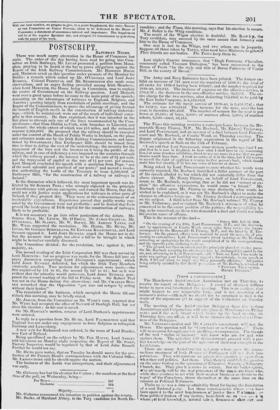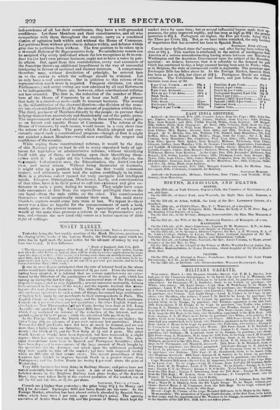rFROM A COIMSPONVENT.]
The Manchester Anti-Corn-law Association net on Thursday, to receive the report. of the Delegaus. A crowd of dranken radians broke in upon and interrupted the meeting. This is an aseident that might happen to met y respectable body. and is not deserving of It moment's notice—a:tit:nigh we shcailti not be surprised to find it the staple of the arguments (?) in support of the Corn-laws on 'fuesday week.
The meeting of the Anti-Corn-law Delegates from the various Associations and Corporations will take place at Manchester on Friday next ; and if the rude brawl voLtCl br‘die up the local inek•tilk.r Olt Thursday have any eff,.et, it will be to increase the umober rin- ness of the Delegate:.
Mr. Vims Ens's ontion and Mr. CAVIEV'S amendment will test the House. The question will be Corn-laws or so Corn-laws ?" There will be no room for egnivoca.ioti shuffling, or compromise. The friends of the real " rights of know who are for and who against them. The aeitation e. ill theneedtrward proceed with a per- fect knowledga ou the part of the :lei( :tors of their real streligth in the Legi sin t are. l'here are many Anti-Corn tlaw te.:1:ators whom even the contu- melious treatment of hutii Houses of Parliament will not drub into politicians. They will continue to I:it ate this ‘luestion nprt front what they call politics. Let them. They thereby establish th question on the same titoting as the questions of Education. Slavery, a Voluntary Church, Szsc. They give it a status in society. But the bolder spirits, who ultimately will be the real p-outoters of the cause, are those who, while they continue to act with their weaker brethren as friends to the r,spea! of the Cora-laws, throw themselves at the same time on the country as Political Reformers. There ne:e: was a :bite so admirably fitted for laying the foundation of a real National p..rty. Let those constimencies Whose eyes have been opened to the utter hopelessness or justice fro.a P. flame'. or from political leaders of any fiwtion, henceforth re. m teen uto. e whose 101 tical knowled_se, natural talent, firmness of char icier, and independence of all but their constituents, they have a well-grounded confidence. Let these Members and their constituencies, and all who sympathize with them throughout the empire, carry on a combined system of agitation both -within and without the House of Commons. Let petitions from without give rise to debates -within, and debates within give rise to petitions from without. The first position to be taken up is a thorough Reform of the Representative body. No satisfactory reason can be assigned why every individual whom the law recognizes as fit to con- duct his (or her) own private business, ought not to have a voice in pub- lic affairs. But, apart from this consideration, every real extension of the franchise throws an additional impediment in the way of successful intriguing in favour of sectional and sinister interests. A compromise therefore may, without dereliction of principle, he entered into as to the extent to which the suffrage should be widened. Let its only have a real extension. But in addition to this reform of the representation much more is required. Frequent elections, (or short Parliaments,) and secret voting, are now admitted by all real Reformers to be indispensable. There are, however, other constitutional reforms not less essential. The first is, the reduction of the number of Mem- bers of the House of Commons by at least one half. At present that body is a crowd—a mob—unfit to transact business. The second is, the redistribution of the electoral districts—the division of the coun- try into electoral districts fixed by the amount of population within them. The third, payment of Members directly by the people; to prevent their helping themselves excessively and fraudulently out of the public purse. The improvement of our electoral system, by these reforms, would give ns- an honest and capable House of Commons. The reform of the House of Commons, by such means, would iusure in a very short time the reform of the Lords. The party which frankly adopted and con- sistently urged such a constitutional progress—though at first it might not number a dozen Members—would soon conciliate the respect and confidence of the country.
While urging these constitutional reforms, it would be the duty of this National party to lend its aid to every organized body of agi- tators for legislative or administrative reforms, without identifying itself with any of them, or insisting upon their identifying them- selves with it. It might aid the Voluntaries, the Anti-Slavers, the
stematie Colonization men. the Educationists, the Anti-Corn-law men, and many others. Without being dictatorial or dogmatic, it might take up a position which from the first would command respect, and ultimately must lead the nation confidingly in its train. Here is a glorious career opened for truly energetic and intelligent minds. Glasgow, Birmingham, Manchester, Leeds, and constituencies of that class, have it in their power to call into existence and give en- durance to such a party during its nonage. They might have sonic rude encounters at first from the supercilious privileged class on the one hand—from the rude rabble on the other. The constituencies themselves would occasionally mistake their men. But, amid many blunders, matters would come into train at last. We repeat it—there never was a time so hopeful for the commencement of such a bold, manly game, as the present moment. The operations of such a party -would at the same time promote a reform in our Representative sys- tem, and educate the new (and old) voters to a better exercise of their right of suffrage.



























 Previous page
Previous page